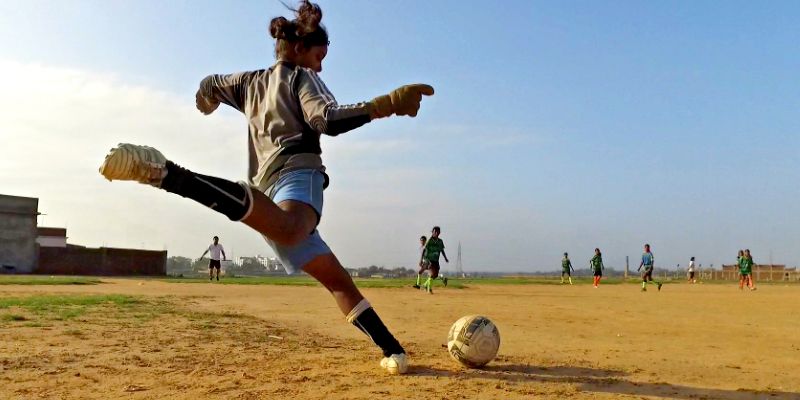These tribal girls are playing football with one goal: to build a school for themselves
When Franz Gastler was living in a Jharkhand village, he noticed three things right away. First — while boys play, the girls work. Second— the boys get all the benefits, but seem to do the least with them. Third, what little is invested in a girl, she multiples almost beyond belief.

The backdrop
Most families in the region believe that girls will not support the family financially in the future, and her education isn’t important. They believe it’s wiser to save money for a girl’s dowry than it is to waste it on school. Here, six out of 10 girls are forced to quit school and become child brides. A girl born here is extremely isolated: she is expected to prioritise housework over her education, uphold the family’s honor by cloistering herself inside the house, marry as a teenager, and move into her husband’s house to have children of her own. They’re also at risk of being trafficked and treated as modern-day slaves.
Rural Jharkhand has some of the highest rates of female illiteracy, child marriage, and human trafficking. In 2009, Franz Gastler originally started Yuwa as a scholarship fund for high-achieving village students in government schools.
“Here, 92 percent of homes lack toilets. Walking to distant fields, girls are especially vulnerable to attacks. Human trafficking is prevalent in Jharkhand; girls are sent to cities to work as domestic help. They’re often treated as slaves, and are at risk of sexual abuse,” says Franz Gastler, Founder and Executive Director, Yuwa.
So, when a 12-year-old girl from an English class he taught said she wanted to play football, Franz, amused but impressed, asked her if she’d put together a team, and that he’d coach it if she does. “I’ve never seen anyone so hungry to learn and excel as girls here,” he says.

Bending the rules
Football teams became the core of Yuwa’s programmes. “The model of a football team has proven to be an exceptionally powerful way of building what are essentially girls’ self-help groups. Within the team, the girls create a counter culture where it’s cool to be an ambitious girl.”
The girls on the first Yuwa team chose to practice at dawn every day, racing back to their homes in time to do chores. They created a team savings plan to purchase balls and requested extra English classes. After a year, the football girls had become more confident and much better students. In contrast, the students on scholarship (and not playing football) had missed 40–50 days of school. “The structure of a football team proved to be an exceptional way to bring girls out of isolation, connect them with each other, and get them to refocus their lives towards education,” says Franz.
Chanda,14, one of the players, says, “I play football and do housework, and don’t have time for much else.” Monika and Radha, also 14, are also on the team. All three of them have been playing for three years each.
When we asked them whether it was common for girls in Jharkhand to play a sport like football, they broke into a fit of laughter, and exclaimed, “not at all!”
Chanda says, “It was really hard to find time to practice. We practiced before school. After school ends at 2:45, I had to do housework – clean, sweep, and help make dinner.”
Most of the girls’ parents were not initially supportive of their daughters playing football, taking their studies seriously, or spending time outside the house. People in the village often mock the girls for wearing shorts and ‘acting like boys’. “These girls are the first people in their village to go abroad or fly on an aeroplane – to Spain twice and the US once; some parents are starting to change their minds and give their daughters more freedom. Despite their successes, many of the senior players still have the same arguments with their families and neighbors, in which they have to defend their right to an education and to play.”

To bend it like Baichung!
The girls travelled all the way to Spain to play in a prestigious youth soccer tournament, the Donosti Cup. The team has a two-fold objective – do well at the tournament and more importantly, raise funds to build a school in their village, Hutup, in Jharkhand
Monika says her favorite moment was trekking and zip-lining with the tournament director’s daughter. “That was a surprise for us. It was my best day!”
For Radha, everything from playing on the actual field with the Spanish girls, and the beach party that came afterwards, was exhilarating. “I went to the beach for the first time. We got to swim and see the waves.”
Currently, Yuwa has about 30 young coaches (90 percent of whom are girls). The girls who played in Spain this year practiced as a team for four months, although each of them has been playing football with Yuwa for two – six years. They practice from 5 am – 7:30 am five days a week, in addition to attending a weekly team-building workshop.
Sport imitates life
Yuwa’s education and health programmes are linked and held together by the strength of the football teams, and positive peer pressure. Entire teams will attend Yuwa classes together, and if a girl stops coming, she is immediately missed and sought out by her teammates. It was the girls’ concerns about their higher education and ambitions for the future that inspired Franz to even start the Yuwa School: a full-time, low cost, all-girls school.
The Yuwa School uses innovative pedagogy, English immersion, a low student-teacher ratio, and technology to help each student reach her full potential. The current campus can accommodate only 86 students.
Each Yuwa team creates a savings plan to purchase balls and shoes. This ensures that girls learn how to manage money and develop a deep sense of ownership over their team – and now, the budget had a few additions, that is, the construction of this school and its administration. Enter, the Girls with Goals Campaign, and Lenovo’s big guns to see this dream through.
Kick for a Brick for the girls with goals
One of the primary objectives of this digital-led campaign is to raise funds for the girls to realise their dream of building a school in Hutup, which they believe will help bring more girls into the fold of Yuwa. To ensure that this message reaches a larger audience and to engage them in the noble cause, Yuwa, backed by Lenovo, initiated the ‘Girls with Goals’ campaign.
“When we first heard about the Yuwa girls, in 2014, we felt that their story needed to be told to a larger audience, and the way in which they have taken charge of their destiny, needed to be celebrated. This is how our partnership with Yuwa came about, and almost three years later, it is stronger than ever before,” Bhaskar Choudhuri, Marketing Director, Lenovo India.
The campaign documented the unusual and inspiring journey of the girls from Hutup to Spain through a series of real-time long format digital videos on Facebook, YouTube, and on the campaign microsite. The story touched 14 million hearts, scoring over five million views, and over 11,000 shares. The campaign also trended on Twitter.
Another significant part of the campaign was the social media hashtag #KickForABrick, an idea that invited the community to add bricks to Yuwa’s new school in Hutup. The social media community was asked to kick a ball, and share it on social media and then nominate their friends to build a chain. Bollywood superstars Ranbir Kapoor and ace footballer Sunil Chhetri also joined the campaign, and featured in the documentaries. The initiative garnered massive eyeballs on Twitter and other social platforms and a total of 400 videos have been submitted so far.
Every drop counts
The Kick for a Brick campaign is extremely important for the future of Yuwa, and will help them raise the necessary funds to make the dream of the Yuwa School a lasting reality for generations of young female leaders in India.
The team didn’t make it through to the finals of the tournament, but the girls were anything but disheartened. “I think I achieved my goals. My goal was to go to Spain and learn something – my goal wasn’t winning or losing,” says Radha.
“After our lease runs out in 2016, Yuwa will shift to a new, permanent location on two acres of land that has been donated. The new campus for the Yuwa School will accommodate more than 300 girls, with a holistic focus on leadership development and academic excellence.”
The architectural renderings for the Yuwa School have been completed pro bono by Frischmann Prabhu, the architectural firm that designed the Delhi Metro Stations.
The campaign has entered phase two, that entails crowdfunding and seeking donations. At the same time, the girls say they have found their calling, and want to focus on practicing; not just for their hearts, but for their futures.









![[Funding roundup] Hospals, HYPD, Oben EV, SustainKart raise early-stage rounds](https://images.yourstory.com/cs/2/a09f22505c6411ea9c48a10bad99c62f/Image03w0-1640781482458.jpg)
